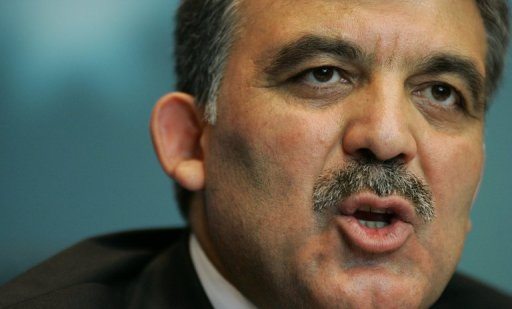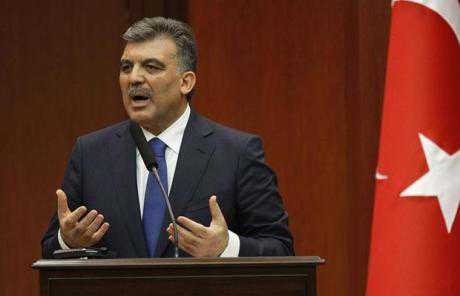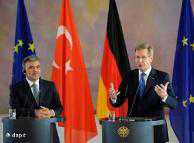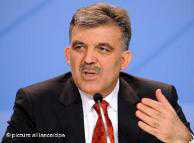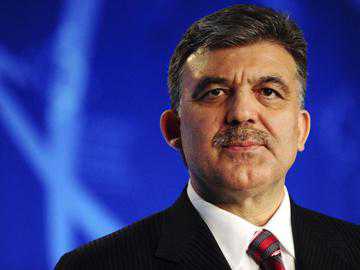“Turkey is a natural part of Europe,” he told The Sunday Telegraph in the elegant, cream marble surroundings of his Ankara palace.
“Being a member of the Council of Europe and the European Court of Human Rights; being one of the oldest members of Nato, as well as being part of European culture and art – this is a natural path Turkey is flowing into.”
Mr Gul, 61, founded Turkey’s ruling AKP party before becoming prime minister and then foreign minister. He speaks with the calm, self-assured manner of a diplomat, talking in Turkish through a translator but then interrupting in English to finesse his points.
Several years spent at university in Exeter and London have given him a strong grounding in English, and he is already acquainted with the Queen, who visited Turkey at his invitation in 2008. His visit to London is the first by a Turkish president for 23 years.
Above Mr Gul’s expansive desk hangs a portrait of Kemal Ataturk – the revered founder of the nation, and the original driver of Turkey’s push for western acceptance.
Ataturk shocked Turks by wearing a suit and tie rather than typical oriental dress, and urged his countrymen to turn their backs on mystical eastern influences, and embrace western, secular ways. Were he alive today, there is no doubt that he would share Mr Gul’s desire to join the EU.
After years of foot-dragging by some EU governments, Turkey was officially allowed to open membership negotiations in 2005, but progress has been at a snail’s pace. Britain has constantly backed its aspiration, but other EU members are opposed.
Among them, Angela Merkel, the German Chancellor, has offered instead only what she calls a “privileged partnership”, which Turkey rejects, while French President Nicolas Sarkozy argues that the current discussion on increasing fiscal federalism within the EU makes enlargement “impossible”.
Mr Gul accuses them of raising what he considers to be “artificial” concerns. “Some people who think in a narrow scope and who do lack a strategic perspective consider Turkey’s membership a burden,” he said.
“But those who can think 30 years, 60 years ahead, and who can think about the changing trends in the economy and the changing centres of power, can understand how much strength Turkey can bring to the existing strength of Europe.
“In the past it was only considered from the perspective of security, Turkey being a strong and old member of Nato.
“But now, consider the potential that Turkey has: Turkey’s position, her assets, the value she can add in terms of energy resources, her population, the dynamism she can bring into Europe, and also the growth that she can bring, with Turkey being the engine of this growth.”
Yet Turkey’s booming economy may, ironically, push it away from Europe. While EU members struggle with anaemic growth, in Turkey the annual growth rate touched 11.6 per cent during the first quarter of this year – and in the busy streets around Mr Gul’s palace, some wonder whether joining this union of floundering financial failures is such a smart move, after all.
“Last year I supported Turkey joining the EU, but not any more,” said Yamac Guney, 33, a petroleum engineer. “Firstly, a lot of countries have been saying really negative things about Turkey. Why should we join if they don’t want us in their club? We’re economically and politically stronger now, so maybe we don’t need them.
“Then there’s the worry that the economic problems of Italy and Greece could spread to us. And finally, the EU participation process has created a lot of new laws. Some are good and necessary, but others ban important aspects of Turkish culture.”
Mehmet Ozgun Yar, 28, a businessman, agreed. “Most people in Turkey wanted to be in Europe five years ago, but not now. Our economy is strong, so why would we want to tie ourselves to their weak ones?”
But Mr Gul dismisses such fears, arguing that the current problems are temporary.
“We see the confusion, but we believe this is going to be a temporary situation within the European Union. And we approach the negotiations with a strategic vision, and are very determined.”
That same “strategic vision” is evident in Turkey’s foreign policy, particularly its relations with such troublesome neighbours as Iran, with which it shares a 190-mile frontier.
Mr Gul sees himself as a mediator in the escalating confrontation between Tehran’s theocratic regime and the West, and warns of a new standoff as serious as that which divided Europe for 40 years.
“Iran is a very important country in the region, with its potential, its history and its culture,” he said. “The situation in a way is turning into another era of Cold War. And for that we are trying to eliminate the lack of trust or the lack of confidence between Iran and the Western world, trying to build confidence and acting like a catalyst, for example concerning the nuclear issue.”
So does that mean that Mr Gul trusts the mercurial President Mahmoud Ahmadinejad enough to vouch for him internationally?
“Rather than having confidence, our position is rather of being capable of having very open and sincere talks with Iran,” he said, picking his words with care.
“When we say Iran, it is not only the government. There are many centres of power within Iran, and I believe our capability of having discussions with these different circles is of great value.
“Maybe this is the first time that I’m putting it in such a clear manner, with my own words. There are different centres of power in Iran. The government, the assembly, the parliament, the religious leaders. The military is another one.”
In neighbouring Syria, Mr Gul believes that Turkey has an important role as its views carry more weight than those of critics outside the region – but he is much blunter about the problem.
Last week Turkey ratcheted up the pressure on President Bashar Assad, threatening to cut off the electricity supplies, and the Turkish prime minister, Recep Tayyip Erdogan, said the future could not be built on “the blood of the oppressed”.
Mr Gul said: “I strongly believe that there is no place any more for authoritarian regimes – single party systems that do not have accountability or transparency – on the shores of the Mediterranean.
“As someone who has studied in the United Kingdom, lived in the United Kingdom, has this world view, President Assad should be able to understand this.”
Until the Arab Spring begun, the two countries enjoyed cordial – although never particularly warm – relations and Mr Gul said he had been urging his Syrian counterpart to embark on a programme of democratic reform.
“We strongly advised him to hurry up and accelerate the pace of reforms. Otherwise, if he was not the leader of the change himself, then things would turn out to be too bad, we said to him.
“When any kind of movement has its roots among the people of the country and the walls of fear come down, then the end result is very obvious.”
Last week there were reports that Turkey was tacitly supporting armed insurgents preparing to attack Mr Assad’s regime across the border. Mr Gul denies that an armed offensive is being planned, but accepts that Turkey has welcomed regime opponents.
“With a strong and clear voice we are saying that the legitimate demands of the people are being supported by us. We enable them to have their meetings and discussions in a free environment, and provide a diplomatic platform.”
He is proud of Turkey’s support for democratic movements in the region. “Turkey is a centre of inspiration for the countries of the Middle East,” he said. “Being a Muslim country, the countries of the Middle East closely follow developments in Turkey.
“If Turkey can achieve democratic standards, rule of law and successes in economic life, they ask ‘Why can’t we do it?’ They start questioning it. And this puts it into action. And I believe this is a major contribution.”
Turkey’s position as a Muslim country run on secular principles brings some problems, however.
Since Ataturk enshrined secularism in the country’s DNA, it has since been fiercely protected. But the election in 2007 of Mr Gul, a devout Muslim whose wife Hayrunnisa wears a headscarf – banned in Turkish public buildings – led to concern that the country is veering from its secular path.
Standing outside Ataturk’s tomb – a huge mausoleum on an outcrop overlooking central Ankara, where hundreds of thousands of Turks pay their respects each year – Hussein Akay, 21, a translator, said he worried that those values were being eroded.
“President Gul wants to be very Muslim, and that’s not right for our country,” he said. “He’s much more of an Ottoman, while Ataturk was all about freedom and Western values. I think Gul’s a good man, but I worry the country is becoming more Islamic.”
But Mr Gul has little time for such talk. “Throughout these past 10 years, there has been much reform in law, politics and with the EU. And when you look at all of these… there is no basis for those sceptical views.
“Turkey’s future is very open and bright and the reputation of our nation has grown as the result of all these developments.
“When you think that Turkey is a Muslim country, being able to realise all of these methods is an extraordinary success story in the world, and for the world.
“I believe this is a unique present that can be given in the world.” The question remains whether Europe is ready to accept it.
